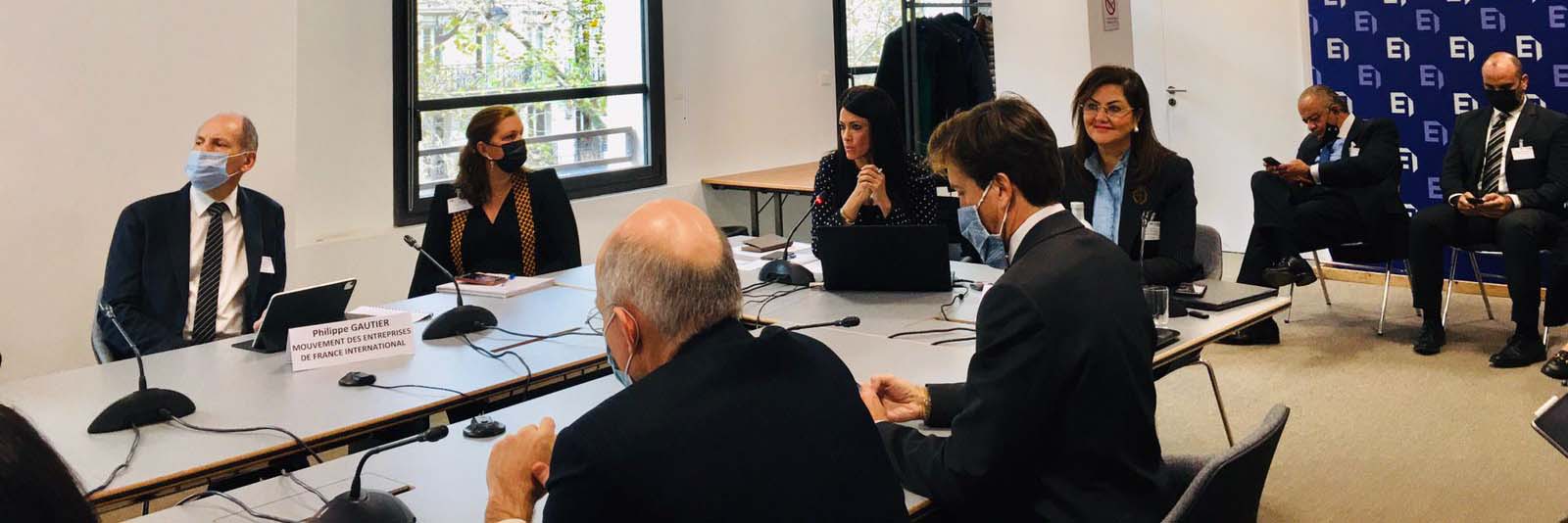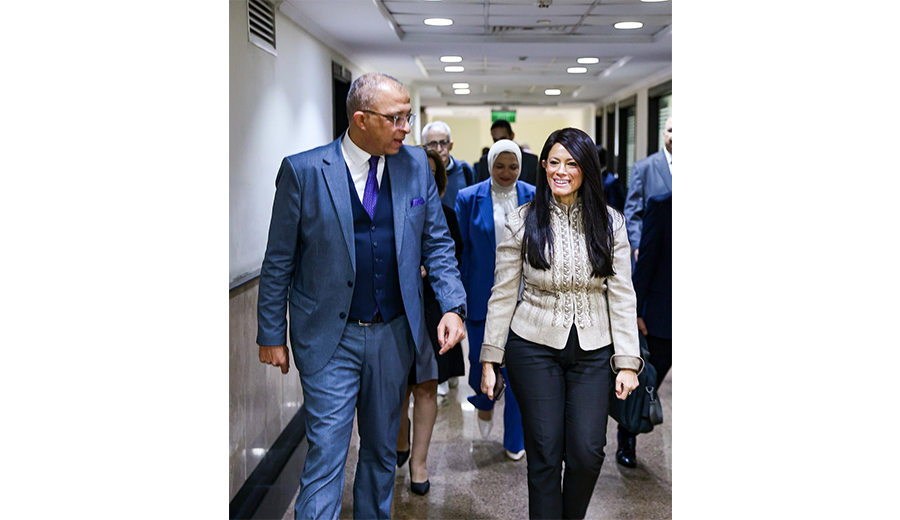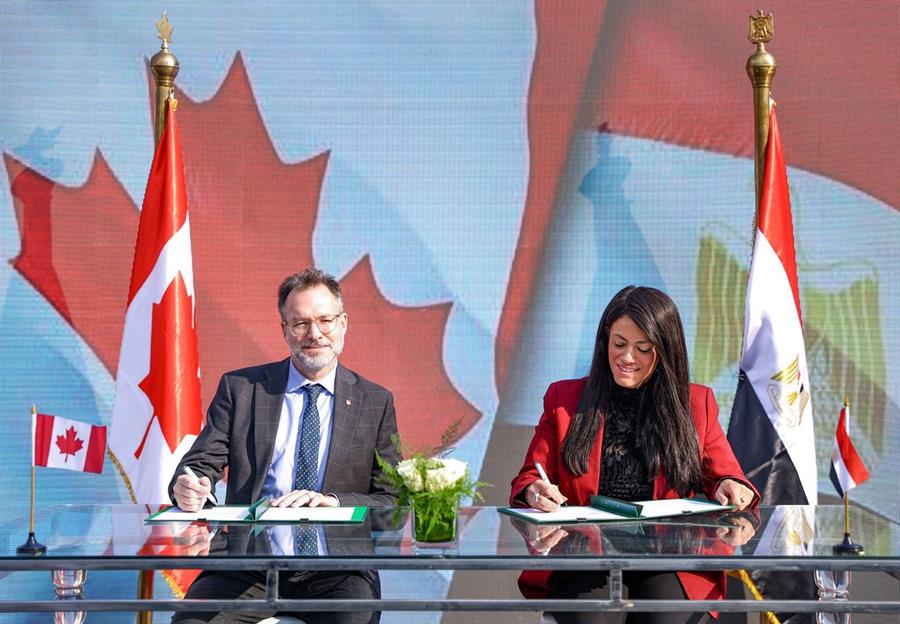During her participation in the Prime Minister's tour in Paris The Minister of Planning and Economic Development participates in a round table with representatives of the French private sector on "Infrastructure for major projects."

25 October 2021
Egypt has invested EGP 2.3 billion in the infrastructure during 7 years: Says Hala El-Said
Dr. Hala El-Said, Minister of Planning and Economic Development, participated today in the round table held with representatives of the private sector on the topic of "Infrastructure for Major Projects", in the presence of Dr. Rania Al-Mashat, Minister of International Cooperation. El-Said’s participation came while accompanying the Prime Minister, Dr. Mostafa Madbouly, on his visit and members of the Egyptian government to the headquarters of the Organization for Economic Cooperation and Development in the French capital, Paris, from 23 to 27 October.During her speech, El-Said indicated that the first phase of the National Economic and Social Reform Program was launched in 2016 with a clear goal of implementing a series of reforms that contribute to macroeconomic stability and sustainable growth. El-Said explained that these wide-ranging reforms included controlling both financial and monetary policies by restructuring some sectors, most notably the energy sector, liberalizing the exchange rate, and improving the investment climate to increase competitiveness and restore investor confidence in the Egyptian economy.El-Said stressed that investment in infrastructure is one of the main pillars of the economic and social reform program, adding that investment on a large scale in infrastructure projects contributes to stimulating market demand for other economic sectors, which encourages investment in them, stressing that this is what happened in Egypt.
El-Said explained that Egypt has taken great steps to improve the quality of infrastructure, pointing to an increase in infrastructure investments by EGP 2.3 trillion Egyptian, equivalent to $143 billion in infrastructure over the past seven years, an increase of 340 percent since the fiscal year 2015/2016.El-Said explained that the sector is expected to grow between 2020-2024, as this growth will be primarily driven by active partnerships between the public and private sectors and the expansion of green buildings to increase energy efficiency and advanced infrastructure.Believing that infrastructure is a key enabler for development, El-Said added, Egypt has increased its investments in roads and bridges by more than 90% over the past three years to reach $1.79 billion in 2020 from $0.89 billion in 2018.El-Said also touched on the National Roads Project that was launched in 2015, which aims to construct 7,000 kilometers of new roads in 6 years with a budget of $11 billion, as well as implement complementary works to enhance the existing road network by providing the required maintenance for 5,000 kilometers of roads.El-Said confirmed that Egypt has made remarkable progress over the past few years in modernizing transportation, communications, and digital infrastructure, which was reflected in Egypt's ranking in global indicators. El-Said added that despite the pandemic, the Egyptian government has completed some major projects, as well as the projects that are being implemented, which contributed to alleviating the negative effects of the Corona epidemic on the Egyptian economy, which created a large number of opportunities. The projects included 1,000 companies and nearly two million Egyptian workers.El-Said added that only housing projects contributed to securing 800,000 job opportunities for young people, besides that most major projects are fortunate in being in sectors relatively less affected by the epidemic, with 32% in housing and 27% in transportation, compared to only 3% in the tourism sector.On the modern railways and transport network, El-Said explained that the Egyptian government is working to improve the current railway network by adding more trains and renewing old buses. El-Said pointed out that two giant railway projects are underway, which will significantly reduce commuting time and help reduce Egypt's carbon footprint.El-Said highlighted that the Egyptian government seeks to support the infrastructure for manufacturing through industrial complexes and cities, which will increase productivity and efficiency, explaining that during the past six years, 17 industrial complexes have been established in 15 governorates nationwide to provide 43,000 new direct jobs for young people, adding, That during the past two years, Egypt established three industrial cities.
El-Said talked about the "Decent Life" initiative, stressing that the Egyptian government aims to achieve a regional balance in infrastructure development, at a total cost of more than EGP 700 billion over three years, to develop Egyptian villages through the development of infrastructure projects in various fields, with a focus on education, health, and sanitation, explaining that the initiative targets 4,584 villages spread over 175 centers in 20 governorates, benefiting 58 million beneficiaries in total.El-Said explained that the Egyptian government has taken several key decisions to support the industries most affected by the closures caused by the pandemic, the decline in aggregate demand, and the disruptions in supply chains as energy costs have been reduced for the entire manufacturing sector, a tax exemption has been provided on real estate for the industrial and tourism sectors, and payments have been increased. Support for exporters, discounts on fuel prices has been introduced for the aviation sector. Support has also been provided to special economic zones, with their exports exempt from value-added tax.On the government's efforts towards establishing sustainable communities, El-Said indicated that the Egyptian government has spent $2.3 billion in developing slums. She also addressed the discussion about building fourth-generation cities.El-Said indicated that the total area of land allocated to the new cities is 7.5% of the total land area, which will increase the total inhabited area to 14.5% once the cities are established. In her speech, El-Said touched on the new administrative capital, which was built at the highest international levels and is expected to accommodate up to 7 million people, as well as the new city of Alamein, which represents integrated tourism and urban project, and the new East Port Said city, which includes an industrial area, in addition to El Galala City, which includes many tourist service projects.Regarding transportation projects, El-Said referred to the Greater Cairo Metro network, where the fourth phase is being implemented at a total cost of EGP 5.4 billion Egyptian, in addition to 485 million euros. On the national road project, El-Said explained that the road infrastructure has witnessed a great development since 2014 when the state launched its national road project for EGP 36 billion, which has reached its fourth stage now, as it will add 13,000 kilometers of roads to the network upon completion of the project.This is in addition to the monorail project, where Egypt is working to establish the longest monorail system in the world, and it will enable rapid, sustainable, comfortable, and safe transportation for 45,000 passengers per hour in each direction, explaining that the goal of the project is to reduce traffic in Cairo and connect new cities with central Capital









